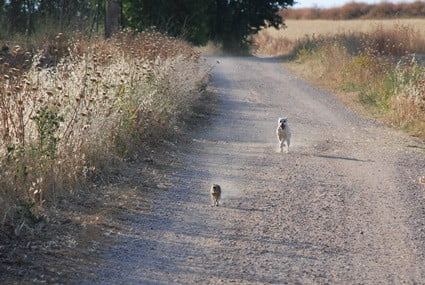Why Do Dogs Like to Chase Bunnies?
Bunny chasing is motivated by a strong prey drive. Many dog breeds were bred to chase bunnies and other animals that move. A prey animal’s instinctual response is to run, and dogs can’t resist but to give chase.
Chasing is also fun for dogs. It stimulates them both mentally and physically and allows them to release pent up energy. When your dog is in the middle of a chase, it will ignore any calls to stop it because it is so focused on catching its prey.
As small, fast animals, most bunnies can escape a dog’s clutches. But not all dogs will kill the bunny it manages to catch. Some will sniff the animal or encourage it to play. Many dogs will let the rabbit run away because it doesn’t know what to do with it.
However, once a dog has chased a bunny, it is likely to repeat this behavior unless it is encouraged to stop. It may also progress to killing and eating the bunny as it gains more confidence.

#3: Countercondition and desensitize
VCA Hospitals define these methods as:
Gradually exposing a dog to their stimulus.
This aims to lessen fearful reactions from them. Which can remove unwanted behaviors after said exposure.
Now, counterconditioning and desensitization are often confused with each other.
Although they have the same aim, the methods are different.
With counterconditioning, you change your dog’s reaction by using a positive experience. Most of the time, it’s associating the stimulus with a treat or praise.
Then, desensitization works on getting your dog to ignore the stimulus.
Without these training methods, Fido might keep killing rabbits whenever they see one.
But every small animal that catches their attention can be Fido’s next victim.
Why choose when you can use both?
That’s right. The 2 are often interchanged because they’re usually used together.
So, watch this helpful video on how to desensitize and counter-condition your dog:
Continue reading: 5 Tips To Train A Dog Not To Attack Rabbits
So how common is it that dogs contract diseases from killing or eating a rabbit?
When referring to the diseases we discussed above, fleas/ticks and tapeworm are by far the most common diseases your dog is at risk of contracting from any rabbit.
Rabies and Tularemia are the more dangerous diseases to look out for.
However, rabies is rare for rabbits to have, plus if you have your dog up to date on vaccines, that should help protect them from rabies.
Tularemia is another serious bacterial disease for concern, but that is also rare to find in rabbits. As always, if you are unsure, take your dog to see the vet out of precaution.
German Sheperds catch and kill wild rabbit
So, there you are in your backyard playing catch with your dog when suddenly your dog bolts after a rabbit and catches and kills it! Your initial thought is, “how sick is my dog going to get!?”
While dogs killing a rabbit is more normal than you think, and the overall risk of your dog getting sick isn’t high, there are some diseases to keep an eye out for.
If you think your dog may be sick from killing the rabbit, there are signs to look for, as well as helpful tips to get your dog back on the mend and understand why your dog went after the rabbit in the first place.